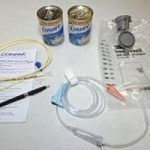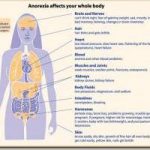Anorexia

The psychology of anorexia is complex and convoluted. There are many ways in which anorexia may present and many precipitating factors that may contribute to the development of this disorder. Although the psychology of anorexia cannot be clearly delineated there are various thought patterns, experiences, personality traits, and biological factors that seem to be present …
Read More

The most common eating disorder is probably binge eating disorder, affecting 2-3% of the U.S. adult population at some point in their lifetime. 1 The qualifier “probably” is used here because, due to the secretive and private nature of binge eating disorder and eating disorders in general, accurate statistics are difficult to obtain. Although anorexia …
Read More

There are many proponents who feel it is important to do whatever is necessary to save the life of someone suffering from anorexia nervosa. However, mental health care experts are on the fence about force feeding an anorexic and for many different reasons. Right to Life? Even When Forced? It’s true that force feeding may …
Read More

The lanugo defnition comes from the Latin word for “down” such as the small hairlike projections on plants. The medical lanugo definition describes fine, downy, delicate hair commonly referred to as “peach fuzz.” Lanugo is normally found on fetuses as they develop but by a gestational age of 33 to 36 weeks it is generally …
Read More

Anorexia has both short and long-term consequences and side effects, some of which can be treated and some of which may remain permanent. Addressing these side effects is best done under the care of a physician, as there are many potential health risks that are associated with anorexia. Physical The effects of starvation and malnutrition …
Read More

No matter how long you’ve battled anorexia, the first step in surviving is admitting there is a problem. As a secretive and seductive disease, anorexia is a condition that can rob you of not only your physical health, but also of your mental well-being and peace of mind. To survive, you’ll need to work hard …
Read More

While the physical signs of anorexia may be more easy to spot in certain individuals, psychological manifestations of the condition may mirror other common mental health problems. Watching for trends in thinking, actions and habits can reveal warning signs. Since early intervention strategies can potentially save a person’s life, knowing and recognizing the symptoms of …
Read More

One of the core characteristics of anorexia is a deep dissatisfaction with body image. From an outsider’s perspective, it may seem like anorexia is a self-esteem issue, but the condition is far more complicated than that. If you want to help a friend or loved one suffering from anorexia, there are certain ways you can …
Read More

In order to help a loved one with anorexia, it’s important to remember that there’s only so much you can do. Ultimately, recovery is the responsibility of the individual. Yet if you are watching a friend or family member suffer from what can be a devastating, debilitating condition, there are a few things you can …
Read More
In a new mouse study performed by researchers from Columbia University Medical Center (CUMC), it appears certain genetic and environmental risk factors can trigger compulsive food restriction, much like what’s seen in individuals with anorexia. The Study The findings of this new study could help to identify new prevention and treatment strategies for eating disorders …
Read More
 Eating Disorder Self Test. Take the EAT-26 self test to see if you might have eating disorder symptoms that might require professional evaluation. All answers are confidential.
Eating Disorder Self Test. Take the EAT-26 self test to see if you might have eating disorder symptoms that might require professional evaluation. All answers are confidential.
Find a Treatment Facility Near You
Click on a state below to find eating disorder treatment options that could be right for you.









 Eating Disorder Self Test. Take the EAT-26 self test to see if you might have eating disorder symptoms that might require professional evaluation. All answers are confidential.
Eating Disorder Self Test. Take the EAT-26 self test to see if you might have eating disorder symptoms that might require professional evaluation. All answers are confidential.